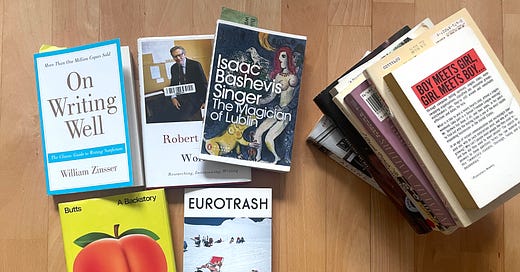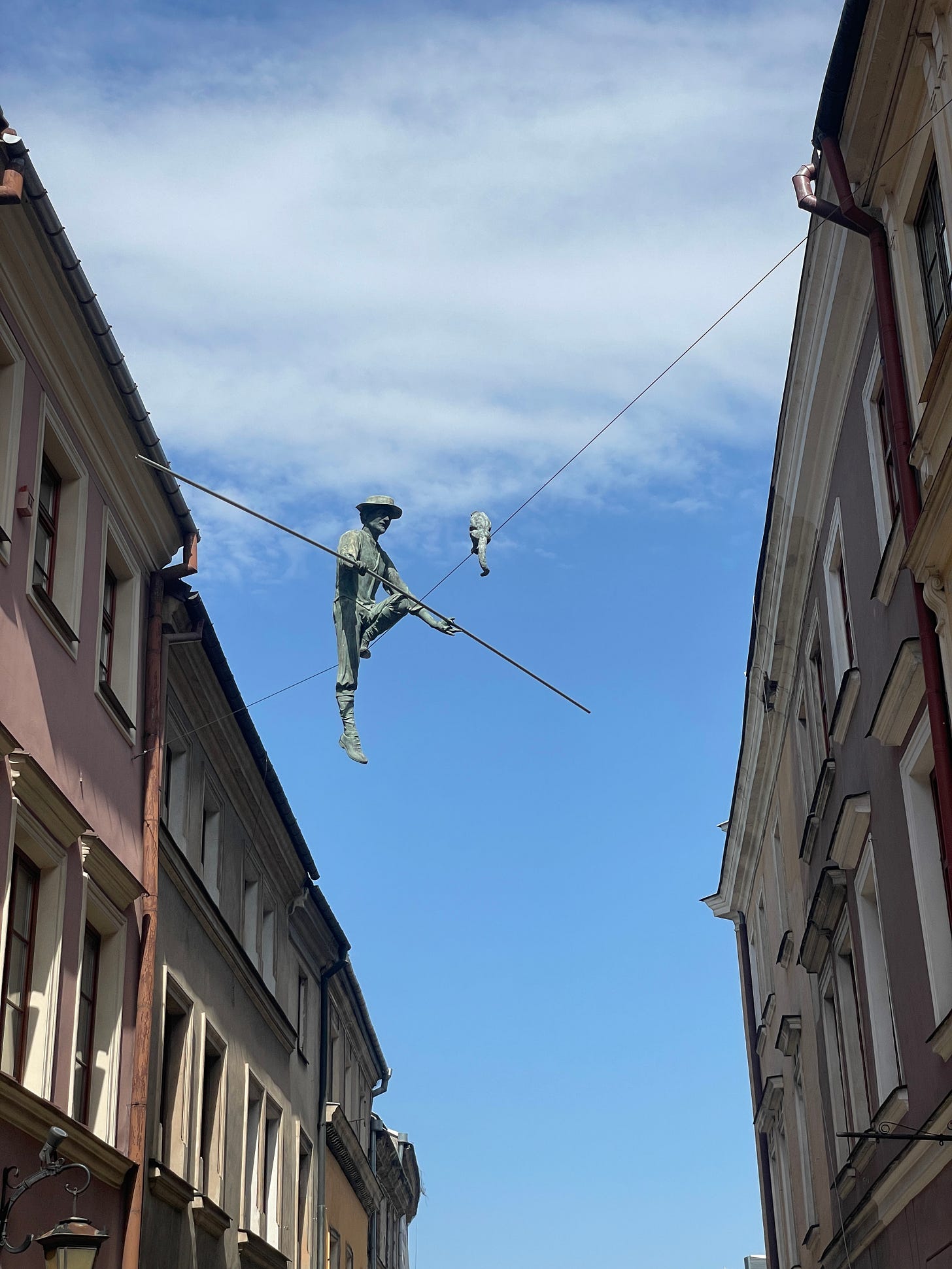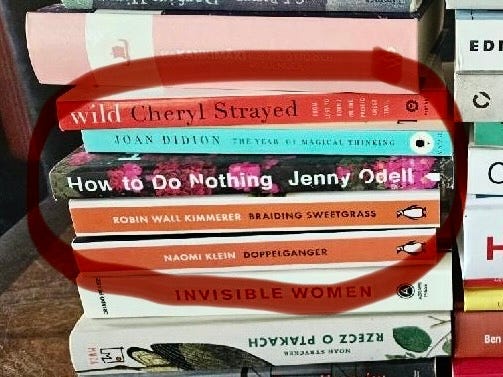My deadline to write 40,000 words is looming, hovering, pressing. June 30, baby! It’s not just writing, of course, it’s research, reading, reporting, all the good stuff that goes into a narrative nonfiction book. This process is giving me so much more appreciation for all the folks who’ve written one before, even if I didn’t particularly like the result. The amount of work that goes into one lil hardcover continues to boggle my mind. I see in one of the books I’m reading “it took me six months to track down this person” and instead of flitting over the line with my eyes, I feel it deep in my bones.
Since I’m on this deadline, I’m really trying to be mindful of my time and saying no to things I’d otherwise like to do (go to Spain, binge watch all of the second season of Secret Lives of Mormon Wives). But I am still reading, and specifically reading not just book material. If I did only that I’d probably lose my mind. So today, instead of a long essay, please enjoy these little lists, which will hopefully give you an idea for your next read. Some of them I’ve written about before, but if you’ve seen them here more than once that just means you should really listen to me and go get it from the library or your local bookstore.
Recently finished
Frostbite: How Refrigeration Changed Our Food, Our Planet, and Ourselves by Nicola Twilley. This was in my new nonfiction TBR pile, and it did not disappoint – in particular, it delivered on the subtitle. I spoke about this book at some family gathering and my cousins gave me a look like I was crazy, like “wtf why are you reading about refrigeration?” Excellent question, I have no idea why. But it’s the kind of book that gives you a completely different lens on the world. I think about it all the time.
Eurotrash by Christian Kracht. A slim book of slightly deranged Swiss autofiction that I picked up because of the cover and the title, and because it seemed up my husband’s alley. You want to know what it’s about? Take it from the author: “This book is about my mother, who loved vodka and Phenobarbital very much. She was a horrible person but also a wonderful person.” Oh and maybe “I guess what I wanted most was to find a humorous side to my mother´s pain and trauma, and to those decades of Swiss silence.”
On my nightstand
Butts: A Backstory by Heather Radke. I was drawn to this book because of the title and the giant emoji-like peach on the cover, but also because it is a socio-cultural history on a topic that may seem silly or unimportant, making it a useful model for my own (I feel very validated in my choices since it later appeared on a ton of “Best Of” lists). It’s definitely helping me think through my writing. I’m annotating it like crazy, dissecting her language and way of weaving narrative with analysis.
On Writing Well: The Classic Guide to Writing Nonfiction by William Zinsser. This is one of those craft books that speaks to me more than others, because of its reporterly directness and good dash of dark humor. No woo woo here. I read a piece about what a wonderful, lifelong teacher Zinsser was, including when he went functionally blind – he’d have people come to his apartment and read him their work. I’m jealous.
Working by Robert Caro. This one also makes me jealous, both of Caro’s talent and his freedom to work on the thing. But this account does not shy away from the costs of it all. And it does push me to be more ambitious.
The Magician of Lublin by Isaac Baashevis Singer. I surprised my husband with a trip to Lublin for his birthday because he’d been reading a lot of Singer lately. I’d only read a story or two, a serious gap for a Polish New Yorker with Jewish roots, so I decided to make up for it. The book is making me pissed off at men, but its transportive powers are immense. It also made walking under the sculpture of the main character in Lublin’s old town very fun.
(My nightstand also includes more than one unfinished book in Polish for a future project. Have I mentioned I have ADHD?)
In my ears
Careless People: A Cautionary Tale of Power, Greed, and Lost Idealism by Sarah Wynn- Williams. I queued this up on Spotify after hearing enough people and podcasts gush about it, and it’s been worth it. No more powerful motivator than book FOMO. It’s an account of policy-making at Facebook in the early years, the baffling and often disgusting behavior of its leadership, and the chokehold of a toxic workplace. It’s dishy, shocking, infuriating – and it manages to be all that for me even though I have a lot of background on this stuff. I covered Facebook policy for several years at Quartz, although after Wynn-Williams’ time on the job. I still wish I wrote the big piece I started reporting on how this corporation was a global lawmaking force unlike ever before – I even sat in on a policy session on Facebook’s campus in Menlo Park, which was fascinating but largely off the record. This book has me nodding a lot.
Bonus
My beloved aunt recently turned 50, and I knew immediately I’d be getting her 5 books for 5 decades. I went for nonfiction, which is generally the preferred genre in my family, and because we both swim in those waters – me as a journalist, her as a sociologist. I also decided it would be books that had been important to me in the last several years, not out of some narcissism, but because they needed to be vetted, and meaningful. Coincidentally – or not, because we are kindred spirits – she then asked guests invited to her birthday party to bring their favorite books.
Here’s my part of that stack:
I’ve written about Doppelganger in my post about unputdownable nonfiction reads – in addition to unputdownable, it’s also changed how I view today’s world. Braiding Sweetgrass and How To Do Nothing both had a similar effect, as I know they had on many others. I’m now thinking I should go back to them because they are so tied to the height of Covid in my mind, and I wonder how the experience of reading them would be different now. We had two devastating losses in our family over the last 5 years, and I don’t know if it exactly helped process anything, but Didion’s The Year of Magical Thinking articulates the many shades of grief like nothing I’d read before. Did I tell my bestie we should go do the Pacific Crest Trail after reading Wild? Of course I did, very much like all the women in the very disappointing Gilmore Girls reboot.
Note: With my deadline coming up, I’m going to slow down publishing a bit, I hope you all forgive me.
My subscription is now voluntary, but if you’d just like to drop a couple bucks once, that’s amazing and greatly appreciated! The tip jar is here.







